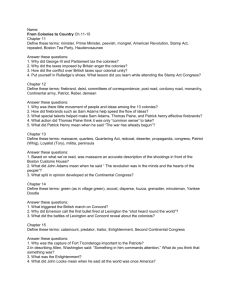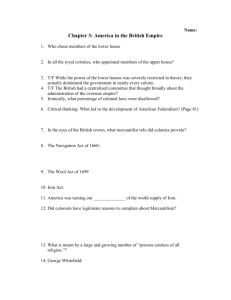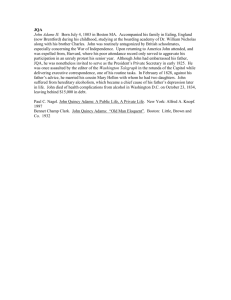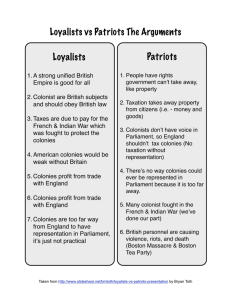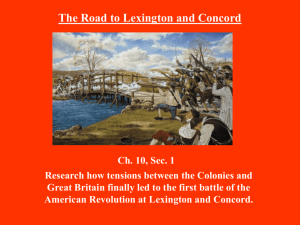Causes of the Revolution War Test
advertisement
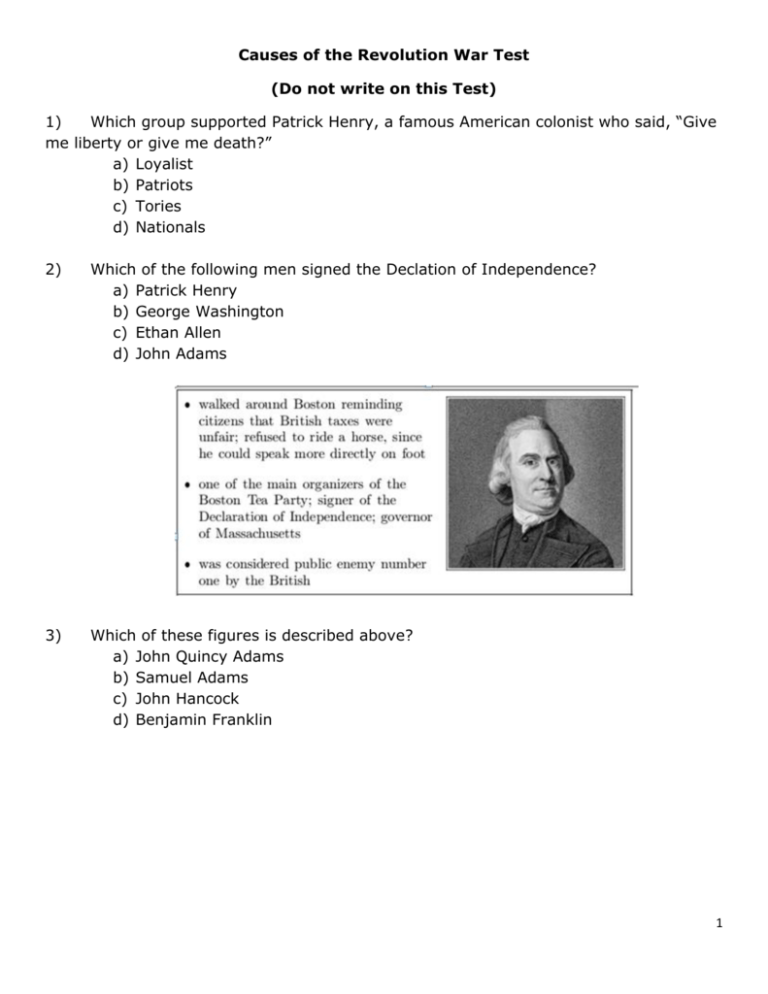
Causes of the Revolution War Test (Do not write on this Test) 1) Which group supported Patrick Henry, a famous American colonist who said, “Give me liberty or give me death?” a) Loyalist b) Patriots c) Tories d) Nationals 2) Which of the following men signed the Declation of Independence? a) Patrick Henry b) George Washington c) Ethan Allen d) John Adams 3) Which of these figures is described above? a) John Quincy Adams b) Samuel Adams c) John Hancock d) Benjamin Franklin 1 4) Which of the following belongs in the center circle? a) James Madison b) Benjamin Franklin c) Thomas Jefferson d) George Washington 5) During the Events leading up to the American Revolution, what did the people listed above have in common? Samuel Adams Paul Revere Thomas Paine a) b) c) d) They were members of Parliament who favored American Their Actions supported the British King They were military leaders in the British army before the war Their actions supported American independence 6) In April 1775, ________________ and _____________________ helped spread the news about the British March on Lexington and Concord. a) b) c) d) George Washington and Ben Franklin Paul Revere and William Dawes Thomas Newton and Thomas Jefferson Thomas Paine and Ben Franklin 2 7) In 1775, the British marched on Lexington and Concord to a) Gather food needed by the British soldiers in Boston b) Conduct a training exercise to prepare for battle c) Force the Native Americans way from Boston d) Capture weapons and power stored by the patriots 8) On April 19, 1775 the American Revolution began with fighting in which colony? a) Virginia b) Massachusetts c) New York d) Pennsylvania 9) General Thomas Gage sent troops to Concord toa) Prevent a town meeting b) Seize a colonial arsenal c) Enforce the Quartering Act d) Capture colonial resistance leaders What battle started the American Revolution and is considered the “shot heard round the world?” a) Trenton b) Saratoga c) Long Island d) Lexington and Concord 10) 11) Who is the man on the horse in the picture? a) Paul Revere b) John Adams c) Samuel Adams d) John Hancock 3 12) Speakers’ A and B remarks best reflect the point of view of which of the following? a) Minutemen of Massachusetts b) Iroquois warriors fighting the Loyalists c) German allies serving with Washington’s army d) Hessian mercenaries 13) The term “mercantilism” is defined as an economic system in which a) Prices are determined by the laws of supply and demand b) Colonies exist for the benefit of the colonial power c) Factors of production are owned by the government d) The proletariat benefit at the expense of the bourgeoisie 14) How did King George III enforce the Proclamation of 1763? a) He threaten war on the colonies b) He kept 10,000 soldiers in the colonies c) He made the parliament pass the Sugar Act d) All of the above e) None of the above 15) British Colonist objected to the Proclamation of 1763 because they – a) Feared it would provoke attacks from American Indians b) Did not want to share control of the fur trade with France c) Resented the limits it imposed on westward expansion d) Wanted to be able to trade freely with foreign nations 4 16) The roots of the plants in the cartoon represent— a) People living in Great Britain b) Opponents of the American Revolution c) Factors leading to the American Revolution d) Laws passed by colonial assemblies 17) The Coninental Congress issued this commission to – a) Benedict Arnold b) Alexander Hamilton c) John Hancock d) George Washington 5 18) All the events listed above occurred during a) The Era of westward expansion b) The Era of Good feelings c) The Revolutionary Era d) The Jacksonian era 19) What a) b) c) d) 20) The purpose of the Quarting Act was to require the colonies to a) Pay for the salaries of British soliders b) Buy only goods that were made in Great Britain c) Provide housing and supplies for British soldiers d) Stop making their own coins use British money instead 21) The coercive, or Intolerable Acts were passed in response to a) The Boston Tea party b) The Stamp Act riots c) The Boston massacre d) The battle of Lexington and Concord 22) One significant impact of the Boston Massacre was— a) The establishment of a colony at Jamestown, Virginia b) A clear understanding of King George’s tariffs c) A deeper divide between Loyalists and Patriots d) The loss of George Washington as a President was the reason Parliament passed the Stamp Act? To raise money in the colonies to pay the costs of defending them To stop the colonist from illegally smuggling goods To put a tax on colonists’ trade with forigen nations To stop the colonist from trading with foreign nations 6 Why is propaganda concerning the Boston Massacre considered biased in the photos above? a) Samuel Adams said the British were not guilty. b) The propaganda only gave one side of the argument. c) There were rumors of a full-scale war against England. d) John Adams defended the troops. 23) The colonists learned that their strongest weapons against unpopular British tax measures was— a) Tarring and feathering customs officials b) Sending petitions to Parliament c) Boycotting British goods d) Writing editorials in the newspapers 24) Which of these was most responsible for American independence from Great Britain? a) Publication of documents like Common Sense b) Bacon’s Rebellion c) Trial of John Peter Zenger d) Introduction of slavery to the colonies 25) 7 26) What colonial group helped organize the event depicted in the drawing? a) The House of Burgesses b) The Tories c) The Loyalists d) The Sons of Liberty 27) _____ Cost saving measure that required the colonies to house British and provide them with supplies. A. Quartering Act 28) _____ Law that places a tax on sugar, molasses, and other products shipped to the colonies. C. Stamp Act B. Intolerable Acts D. Sugar Act 29) _____ Law that required all legal and commercial documents to carry an official stamp showing that a tax had been paid. 30) _____ A series of laws passed to punish the Massachusetts colony following the Boston Tea Party. ******Pre- AP Only****** Answer the question below on your own sheet of paper. Which had a more profound impact on American anti-British sentiment (feeling), the Boston Massacre or the Intolerable Acts? Use specific examples from history to support your argument. 8

